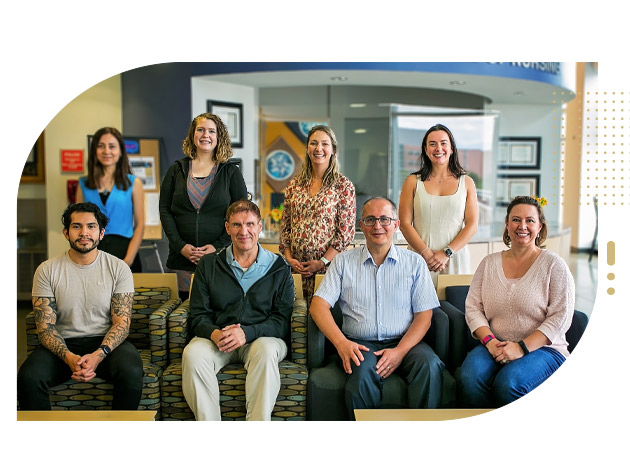Doctor of Philosophy (PhD)
Health Care Systems Research
If you are a registered nurse and can’t wait to climb to the highest level of your education, this is a great program for you. Matching your research interests to our faculty, Health Care Systems Research analyzes how health care is delivered and how people access it. This program focuses on how social factors, personal behaviors, and health technologies impact healthcare access, quality of life, and healthcare costs.
Shift your career in a new direction — train to become a nurse scientist.

Overview
Format
Hybrid online
Mostly online with some in-person requirements on the CU Anschutz Campus in Aurora, CO.
Avg. time to complete
3-4.5 years
8 semesters
Pathway options
Post-Bachelors or Masters
Whether you have a bachelor's in nursing or a master's in nursing, we offer pathways for you to pursue your PhD with us.
Expert faculty dedicated to your success
As the largest PhD program of its kind in the country, many of our faculty are recognized locally and nationally for their excellence in nursing, education, and research. Our educators are passionate about helping students advance their knowledge and careers.
Meet the assistant dean of the program »
Explore our faculty directory »
Hybrid design for flexibility and connection
This program is mostly online and designed to meet you where you are. We offer opportunities to connect with your peers and professors through fireside chats, online discussions, and a 5-day in-person intensive experience as a cohort. Many students work full-time during the program.
External funding options
If you’re interested in pursuing a career in academia, the Nurse Faculty Loan Program can help pay for your PhD. Students also have access to thousands of dollars in grant monies from Jonas Philanthropies, a leading national funder of graduate nursing education.
NEXus
The Nursing Education Xchange (NEXus) is a special program that connects doctoral students from different universities. Take courses not available at your school, choose from classes at top doctoral nursing programs, and explore focused course clusters like Nursing Education or diverse populations.
Career
Hands-on research training
You’ll train to become a leader in scientific research allowing you to manage research teams and hold influential positions in academia, private industry, or the public sector.
Example job titles
- Post-doctoral fellow
- Faculty instructor
- Assistant professor
- Manager of clinical research
What you can do
- Design research studies
- Write grant proposals
- Analyze scientific data
- Teach nursing students
Where you can work
- Colleges and universities
- Hospitals or medical laboratories
- Research facilities
- Government agencies
- + more
What's the difference between a DNP and PhD degree?
The main difference between a Doctor of Nursing Practice (DNP) and a Doctor of Philosophy (PhD) degree is their focus. The DNP program focuses on applying the latest evidence in clinical practice. The PhD program emphasizes scientific research and pairs you with a faculty member who shares your interests. Both degrees offer various career paths in clinical or academic settings and teach strategic leadership skills.
Not sure which is right for you? Contact the assistant dean of the PhD program or the assistant dean of the DNP program to discuss your options.
Admissions
Deadline(s)
| Start term | Application opens | Priority deadlinetooltip | Extended deadlinetooltip |
| Fall 2026 | August 15, 2025 | January 15, 2026 | March 1, 2026 |
Get started
1
Check the requirements
Understand the admissions requirements like how many letters of recommendation you need and what courses should be on your transcript.
2
Start your application
Work on your application and submit it through NursingCAS.
Curriculum
Hands-on research training
In this program, you'll make a significant contribution to nursing by conducting original research. You'll write a comprehensive research paper, a dissertation, about a nursing or healthcare topic you investigate. You’ll also publish one scholarly paper in a peer-reviewed scientific journal and work on a research project, a practicum, where you’ll learn about research methods and the scientific process.
In-depth coursework
This program includes 42 credit hours of classroom learning in a combined online and in-person format. You’ll be required to come to campus for in-person classes three times per year, for “intensives.” You’ll learn how to become a nurse scientist by taking classes like qualitative methods and evaluating healthcare delivery systems.
Skills and knowledge you'll gain
Only have a bachelor's degree and want to get your PhD?
If you have a bachelor's in nursing and take the Graduate Record Examination (GRE), you can get your PhD through our Post-Bachelor's to PhD pathway. Coursework is
individualized for each student. Please email [email protected] to learn more about this option.
Costs
| Residency status | Estimated total tuition** |
| Colorado residents | $44,820 |
| Eligible western state residents** | $44,820 |
| Nonresidents | $77,280 |
| Additional expenses | Time frame | Estimated costs |
| Matriculation fee | One-time | $140 |
| Other fees | By term | Fall $349, Spring $349, Summer $349 |
| Books and supplies | Total for program | $2,000 |
| CU health insurance (may be waived with proof of comparable personal health insurance) | By term | Fall $2,742, Spring $3,838, Summer $1,095 |

![]()
Because it’s one of four PhD programs in the US with a Healthcare Systems research focus, CU [Nursing] topped my list.
- Anthony Velasco, PhD, RN, MS
CU Anschutz Nursing Alumna
Become the nurse scientist looked to first 
Get your degree from the top nursing college in Colorado. Start your journey to become a nurse researcher today.